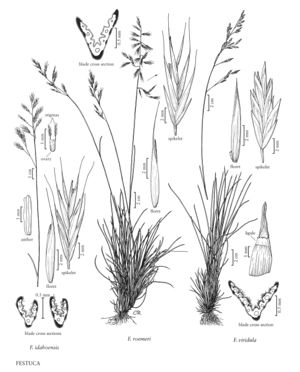Difference between revisions of "Festuca idahoensis"
FNA>Volume Importer |
FNA>Volume Importer |
||
| Line 20: | Line 20: | ||
-->{{Treatment/Body | -->{{Treatment/Body | ||
|distribution=Colo.;N.Mex.;Wash.;Utah;Calif.;Oreg.;Alta.;B.C.;Sask.;Mont.;Wyo.;Ariz.;Idaho;Nev.;S.Dak. | |distribution=Colo.;N.Mex.;Wash.;Utah;Calif.;Oreg.;Alta.;B.C.;Sask.;Mont.;Wyo.;Ariz.;Idaho;Nev.;S.Dak. | ||
| − | |discussion=<p>Festuca idahoensis grows in grasslands, open forests, and sagebrush meadow communities, mostly east of the Cascade Mountains, from southern British Columbia eastward to southwestern Saskatchewan and southward to central California and New Mexico. It extends up to 3000 m in the southern part of its range. It is often a dominant plant, and provides good forage. The young foliage is particularly palatable.</p><!-- | + | |discussion=<p><i>Festuca idahoensis</i> grows in grasslands, open forests, and sagebrush meadow communities, mostly east of the Cascade Mountains, from southern British Columbia eastward to southwestern Saskatchewan and southward to central California and New Mexico. It extends up to 3000 m in the southern part of its range. It is often a dominant plant, and provides good forage. The young foliage is particularly palatable.</p><!-- |
| − | --><p>Festuca idahoensis differs from F. arizonica (see previous), with which it is sometimes confused, in its less prominently ribbed blades and glabrous ovary apices. It has frequently been included in F. ovina (p. 422).</p> | + | --><p><i>Festuca idahoensis</i> differs from <i>F. arizonica</i> (see previous), with which it is sometimes confused, in its less prominently ribbed blades and glabrous ovary apices. It has frequently been included in <i>F. ovina</i> (p. 422).</p> |
|tables= | |tables= | ||
|references= | |references= | ||
| Line 42: | Line 42: | ||
|publication year= | |publication year= | ||
|special status= | |special status= | ||
| − | |source xml=https://jpend@bitbucket.org/aafc-mbb/fna-data-curation.git/src/ | + | |source xml=https://jpend@bitbucket.org/aafc-mbb/fna-data-curation.git/src/8f726806613d60c220dc4493de13607dd3150896/coarse_grained_fna_xml/V24/V24_626.xml |
|subfamily=Poaceae subfam. Pooideae | |subfamily=Poaceae subfam. Pooideae | ||
|tribe=Poaceae tribe Poeae | |tribe=Poaceae tribe Poeae | ||
Revision as of 17:21, 18 September 2019
Plants densely cespitose, without rhizomes. Culms 25-85 (100) cm, usually smooth, glabrous, occasionally scabrous below the inflorescences. Sheaths closed for less than 1/2 their length, smooth or scabrous, rarely pilose, persistent; collars glabrous; ligules 0.2-0.6 mm; blades (0.3)0.5-0.9(1.5) mm in diameter, conduplicate, abaxial surfaces smooth or scabrous, adaxial surfaces scabrous or pubescent, rarely pilose, often glaucous or bluish, veins (3)5(7), ribs (1)3-5, well defined; abaxial sclerenchyma in 5-7 wide, irregular strands; adaxial sclerenchyma absent. Inflorescences (5)7-15(20) cm, loosely contracted or open, with 1-2 branches per node; branches usually somewhat spreading at maturity, sometimes erect, rarely reflexed, lower branches with 2+ spikelets. Spikelets (5.8) 7.5-13.5(19) mm, with (2)4-7(9) florets. Glumes exceeded by the upper florets, ovate-lanceolate to lanceolate, mostly smooth, sometimes scabrous distally; lower glumes 2.4-5(6) mm; upper glumes 3-6(8) mm; lemmas 5-8.5(10) mm, scabrous at the apices, awns (1.5)3-6(7) mm, usually more than 1/2 as long as the lemma bodies; paleas shorter than to about as long as the lemmas, intercostal region scabrous or puberulent distally; anthers 2.4-4.5 mm; ovary apices glabrous. 2n = 28.
Distribution
Colo., N.Mex., Wash., Utah, Calif., Oreg., Alta., B.C., Sask., Mont., Wyo., Ariz., Idaho, Nev., S.Dak.
Discussion
Festuca idahoensis grows in grasslands, open forests, and sagebrush meadow communities, mostly east of the Cascade Mountains, from southern British Columbia eastward to southwestern Saskatchewan and southward to central California and New Mexico. It extends up to 3000 m in the southern part of its range. It is often a dominant plant, and provides good forage. The young foliage is particularly palatable.
Festuca idahoensis differs from F. arizonica (see previous), with which it is sometimes confused, in its less prominently ribbed blades and glabrous ovary apices. It has frequently been included in F. ovina (p. 422).
Selected References
None.
